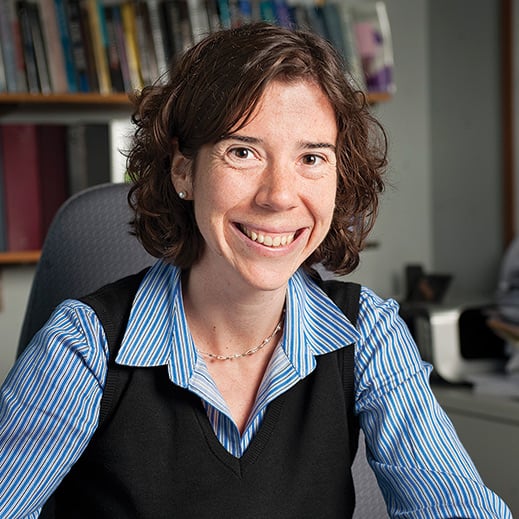Offshoring hit Erica Fuchs’s hometown hard: Reading, Pennsylvania, a former symbol of industrial power, was the nation’s poorest city in 2011. Now Fuchs researches how a manufacturer’s location—in the United States or abroad—affects product development and U.S. competitiveness.

“Growing up in Reading definitely influenced my priorities with respect to thinking about the intimate consequences that global shifts in the technical and industrial landscape can have in the daily lives of people—in my own community and communities like it around the world,” says Fuchs, an associate professor in the Department of Engineering and Public Policy at Carnegie Mellon University.
Her research was recognized in September when she was named a “Top 40 under 40 Young Scientist” by the World Economic Forum. She was part of early discussions held by the President’s Council of Advisors on Science and Technology that led to the creation of the Advanced Manufacturing Partnership, a national effort currently cochaired by MIT president Rafael Reif to bring more high-tech manufacturing jobs to the United States. She also serves on the U.S. Advisory Committee to the International Commission for Optics.
At MIT, Fuchs studied materials science and engineering before earning a master’s degree in technology policy and a PhD in engineering systems. She traveled to China under the MIT International Science and Technology Initiative (MISTI) as a fellow with the United Nations Industrial Development Organization. There, she visited state-run boiler manufacturers across the country, researching the factors that led to innovation.
Back at MIT, in the Materials Systems Lab and the Industrial Performance Center, she studied how national differences in production, regulation, and other areas might enhance innovation and economic growth.
“MIT proved a phenomenal place to grow up, both personally and academically,” says Fuchs. “MIT’s emphasis on never taking oneself too seriously, combined with brutal academic honesty in search of greater truth, are values I continue to carry with me to this day. Within this unique culture, I found lifelong friends, mentors, and colleagues.”
At home in Pittsburgh, Fuchs has plenty of reminders of MIT, including her husband, David Andersen, SM ’01, PhD ’05. They met at Carnegie Mellon, where he’s an associate professor of computer science, but they had many friends and interests in common at MIT. In separate years, each ran the MIT Outing Club’s winter mountaineering school. Now they’re passing their love of climbing on to their daughter, Aria Andersen-Fuchs. At 20 months, she’s already accompanied her parents to a peak over 10,000 feet tall.
Keep Reading
Most Popular
Large language models can do jaw-dropping things. But nobody knows exactly why.
And that's a problem. Figuring it out is one of the biggest scientific puzzles of our time and a crucial step towards controlling more powerful future models.
The problem with plug-in hybrids? Their drivers.
Plug-in hybrids are often sold as a transition to EVs, but new data from Europe shows we’re still underestimating the emissions they produce.
Google DeepMind’s new generative model makes Super Mario–like games from scratch
Genie learns how to control games by watching hours and hours of video. It could help train next-gen robots too.
How scientists traced a mysterious covid case back to six toilets
When wastewater surveillance turns into a hunt for a single infected individual, the ethics get tricky.
Stay connected
Get the latest updates from
MIT Technology Review
Discover special offers, top stories, upcoming events, and more.